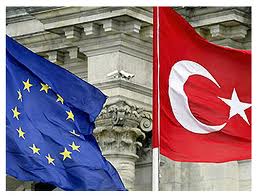Key findings of the 2011 progress report on Turkey
 The Progress Report on Turkey is part of the 2011 Enlargement package adopted by the European Commission on 12 October. The Commission concluded that the country has made progress in meeting EU membership criteria; however, further results are needed as regards fundamental rights, in particular to assure freedom of expression in practice. The report further stresses that the June elections presented the government with a window of opportunity to address reforms with fresh vigour. Turkey continued improving its ability to take on the obligations of membership. The pace of accession negotiations would gain new momentum if Turkey proceeded to the full implementation of its Customs Union obligations with the EU, and made progress towards normalisation of relations with Cyprus.
The Progress Report on Turkey is part of the 2011 Enlargement package adopted by the European Commission on 12 October. The Commission concluded that the country has made progress in meeting EU membership criteria; however, further results are needed as regards fundamental rights, in particular to assure freedom of expression in practice. The report further stresses that the June elections presented the government with a window of opportunity to address reforms with fresh vigour. Turkey continued improving its ability to take on the obligations of membership. The pace of accession negotiations would gain new momentum if Turkey proceeded to the full implementation of its Customs Union obligations with the EU, and made progress towards normalisation of relations with Cyprus.
Political criteria
Turkey continues to sufficiently fulfil the political criteria. Work on implementing the 2010 Constitutional reform package was launched by the government. Free and fair parliamentary elections took place on 12 June 2011, and opened the way for further constitutional reform. The creation of a specific Ministry for EU affairs is an encouraging signal for Turkey’s reform efforts to meet the EU accession criteria.
Significant further efforts are required to guarantee fundamental rights in most areas. This relates, in particular, to freedom of expression, where the number of court cases against writers and journalists, and the restrictions on access to the Internet, raised serious concerns.
With regard to regional issues and international obligations, Turkey expressed support to the negotiations between the leaders of the two communities under the good offices of the UN Secretary-General to find a comprehensive settlement to the Cyprus problem. Despite repeated calls by the Council and the Commission, Turkey has still not ensured full non-discriminatory implementation of its Customs Union obligations with the EU, and the Additional Protocol. There is no progress towards normalisation of bilateral relations with the Republic of Cyprus. As regards relations with Greece, there are continued efforts to improve bilateral relations.
Economic criteria
Turkey is a functioning market economy. It should be able to cope with competitive pressure and market forces within the Union in the medium term, provided that it accelerates the implementation of its comprehensive structural reform programme.
In 2010, Turkish economy grew by 8.9% vis-à-vis 2009, driven mainly by strong domestic demand. The rapid economic expansion continued in the first half of 2011. The private sector, in particular the industrial sector, remains the main driving force behind Turkey’s rapid expansion.
Robust economic development allowed strong employment growth and a sizeable drop in unemployment. Budget performance was better than expected, and the consolidation of public finances is on track. Privatisation has gained momentum. Trade and economic integration with the EU remained high and Turkey strengthened its presence in new markets.
The current account and trade deficits reached record levels in 2010, leading to significant external imbalances in the Turkish economy, which in turn pose a threat to macroeconomic stability.
EU Legislation
Turkey continued improving its ability to take on the obligations of membership. Progress was made in most areas, in particular company law, statistics and trans-European networks. Efforts need to continue towards alignment in areas such as environment, public procurement, freedom to provide services, social policy and employment, and taxation. As regards the Customs Union, a number of longstanding trade irritants remain unresolved. For most areas it is crucial that Turkey improves its administrative capacity to implement and enforce the EU-related legislation.
Turkey remains an important partner in the area of EU energy security. Preparations have continued on the Nabucco project. Negotiations have been finalised on an EU-Turkey readmission agreement, which now needs s to be initialled and signed.
State of play on accession negotiations
EU accession negotiations with Turkey began on 3 October 2005. In total, 13 out of 33 negotiation chapters have been opened and one chapter has been provisionally closed. As a result of Turkey not having fully implemented the Additional Protocol to the Association Agreement, the EU decided in December 2006 that eight negotiating chapters could not be opened and that no chapter could be provisionally closed until Turkey meets its obligations.
EU-TURKEY: KEY DATES
September 1959 – Turkey applies for associate membership of the European Economic Community (EEC).
September 1963 – Signature of the association agreement (known as the Ankara Agreement), aiming at bringing Turkey into a Customs Union with the EEC and to eventual membership.
April 1987 – Turkey applies for full membership to the EEC.
1995 – Turkey – EU Association Council finalises the agreement creating a customs union between Turkey and the EU.
December 1999 – Turkey obtains status of an EU candidate country.
December 2004 – The European Council defines the conditions for the opening of accession negotiations with Turkey.
October 2005 – Opening of accession negotiations with Turkey.
December 2006 – The Council decides that 8 negotiating chapters can not be opened and no chapter can be closed until Turkey meets its obligation of full, non-discriminatory implementation of the additional protocol to the Association Agreement
via EUROPA – Press Releases – Key findings of the 2011 progress report on Turkey.




